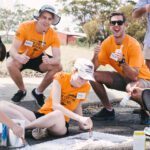Anjali Ghimire found her PhD project via a LinkedIn post. What Nina Tirnitz-Parker and Rodrigo Carlessi found was a research student passionate about translating liver research into life changing medical care.
Anjali Ghimire is a Curtin PhD student co-supervised by Professor Nina Tirnitz-Parker in the Liver Cancer Collaborative (LCC). They reflect on the PhD journey so far, life changing liver research and what makes a good working relationship.
Anjali:
I came across this research project from an advertisement on Nina and Rodrigo’s LinkedIn. It was very intriguing. I just loved the project and I applied. After a few months, I got a response from them and was selected – it was super exciting!
I am from Nepal, and I was looking for opportunities in Australia and other countries where I could work on good translational research. I did my Bachelor of Pharmacy in Nepal, and then my Master of Pharmacology in Canada. After completing my Master, I returned back to Nepal and tried to implement what I had learned. I have always wanted to go into the clinical medical field of research, and it was in Nepal that I found clinical research was flourishing.
Right now, we do not have a good surveillance program that can identify liver disease patients who have higher chances of developing liver cancer in the future. My project is mostly focused on identifying the early biomarkers for the identification of liver cancer in patients at higher risk. Our lab has recently identified the molecular fingerprint of pre-cancerous cells that are found very early on in liver disease patients. We are now aiming to use that fingerprint to classify high versus low-risk liver disease patients so that high-risk patients can be followed more closely, and tumours can be diagnosed at the earliest possible stages when there are more treatment options available.
If a method is developed, it will be very beneficial in identifying patients who have a high risk of liver cancer, and this will also help in the surveillance of those patients.
There are some challenges we are facing, like optimising our protocols, procedures and things, and there has been so many things that are not working as we expected, but we are trying to pass over that hurdle quite smoothly.
Both Rodrigo and Nina have been super helpful and supportive. So far, I have passed the one-year mark and it’s been amazing. Rodrigo has been helping me a lot. The molecular research that we do here is very new for me. Right from day one, they have been supporting and teaching me how things are done here. I came from basic and pre-clinical research, and here, we go very deep into the molecular level, DNA level, of research and everything is new.
I have never been in an operating theatre before. With my supervisor, we went to Royal Perth Hospital and they allowed us to see the dissection of a liver tumour. It was amazing to watch doctors and the whole team do that. We were not only present, but they let us select the area where we wanted to take the tissue from.
Seeing the patient makes you really think about your research and know what you do it for. You see the potential impact of your research right there.
As an international student, I feel really comfortable here, both emotionally and in work. Communicating with our supervisors and having them listen to our thoughts makes a lot of difference as a student, especially when we discuss things together.
Nina:
She was super enthusiastic, which is one of the main things I always look for. I love when a student is passionate about their proposed research. We interviewed a few people, but we just saw that Anjali was a very good fit; she is always very prepared, very meticulous, and really excited about being part of the Liver Cancer Collaborative (LCC).
She pretty much ticked all the boxes of wanting to work in a translational field, having experience in pharmacology – which is rare – so she understands the basis for some of our projects with different aspects. Our team is very diverse, not only in cultural background, but also in training background. We are always very keen to get a fresh perspective; it challenges old ways of thinking.
In the beginning of a project, as a supervisor, it’s important to identify not only the strengths of your students but recognise their weaknesses. It might be their writing or their planning or oral presentations, whatever they don’t feel too confident with, to then provide a bit more assistance around them so that they can catch-up with others.
I love the Nepalese optimism. Anjali always has a smile on her face and approaches things within inner calmness and focus. It is one of her strengths.
A challenge that every PhD student goes through is when, experimentally, things do not work. So you get to a roadblock and then you have to sit down and just reassess and think: okay, how can we approach this differently?
Right before Anjali started, there was a big roadblock. In 2021, we were awarded the Curtinnovation ‘Overall Winner’ Award for the discovery that pre-cancerous cells have a fingerprint you can find, but the way we wanted to go about it – the technical approach – wasn’t very promising at that time. So, we recruited Anjali and then re-assessed.
A PhD project is great, and you want to have something at the end to submit, but a PhD is really you. How you develop as a student. How you stick to things, how you show a bit of tenacity and grit to work through challenges.
In any good working relationship, I think it’s very important to have good communication, clear expectations right from the start and talk about clear timelines. We have team meetings once a week, but we always have an open door for the students where they can come in ad hoc and just talk about problems and check-in. Each side needs to be accountable for implementing what we’ve discussed at the beginning. And then reassess during the project and take stock along the way.
Then, there’s the social side. Christmas functions, BBQ get-togethers. We’re currently talking about bush walking. On Fridays at lunchtime, we have “gastro-lunch” (we work in gastroenterology) where we get together and just have lunch together. If anyone has seen a great paper that they want to discuss or have learned a new technology they want to share with the team – Friday is their opportunity. Anjali wants to organise a trip to Nepal for the whole team… so far that’s aspirational.
Projects always change; that’s just the way research and science works. And it’s important that students become more and more independent – that’s the career, the PhD journey. Supervisors probably give more guidance at the beginning, but it’s also important to let the student take over at some point and then lead their own research.
And that’s the most enjoyable thing: to watch someone mature, become independent and become an expert in their own area.
About the researchers:

Anjali Ghimire is a researcher, registered pharmacist and Lions-Lotus PhD Candidate in the Curtin Medical School. She completed a Bachelor of Pharmacy from Kathmandu University, Nepal, and a Master of Pharmacology from Dalhousie University, Canada. Her current research project involves developing methods to detect liver cancer-specific early markers in patients’ blood who are at higher risks.

Professor Nina Tirnitz-Parker is a Research Academic in the Curtin Medical School at Curtin University, and the Liver Cancer Program Lead and Head of the Liver Disease and Regeneration Laboratory in the Curtin Health Innovation Research Institute. She is also Co-Director of the Liver Cancer Collaborative and Director on the Board of the Gastroenterological Society of Australia.

Anjali is co-supervised by Dr Rodrigo Carlessi, a Research Fellow at the Curtin Medical School. Investigating the molecular mechanisms leading to liver cancer is Rodrigo’s main research focus at the Curtin Health Innovation Research Institute. His contributions to this field of research have been recognised through a recent Cancer Council WA Early Career Fellowship.



